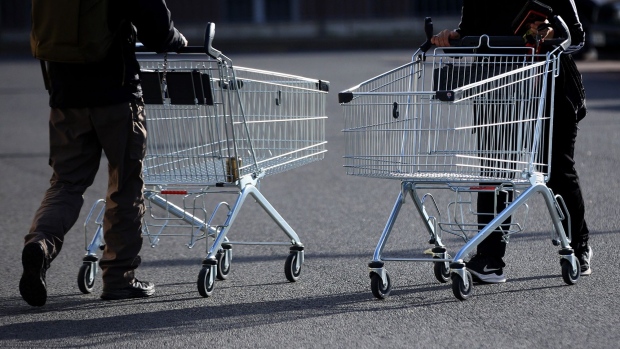Oct 31, 2022
Euro-Zone Inflation Soars to New Record as Economic Growth Fades
, Bloomberg News

(Bloomberg) -- Euro-area inflation surged to a fresh all-time high, while the bloc’s economy lost momentum -- reinforcing fears that a recession is now all-but unavoidable.
Consumer prices jumped by 10.7% from a year ago in October, far exceeding the 10.3% median estimate in a Bloomberg survey.
Third-quarter output, meanwhile, slowed to 0.2% from the previous three months -- more than analysts estimated but much less than the 0.8% advance recorded between April and June. With the energy crisis continuing to ravage businesses and households, the expansion is widely expected to shift into reverse during the winter.
European bonds remained lower after the data, with 10-year German yields four basis points higher at 2.15%. The euro was down 0.3% at $0.9937.
There was good news last week from Germany, the region’s top economy, which defied predictions of a contraction by notching growth that was faster than the previous three months. But it’s still seen leading Europe into a downturn in the coming quarters, with steep increases in interest rates by the European Central Bank adding to the headwinds.
“Recession risks are spreading,” Spanish central bank Governor Pablo Hernandez De Cos told an event Monday in Turkey. “Decisive action by us in the current juncture will support medium-term growth, by reducing inflationary pressures and avoiding a de-anchoring of inflation expectations.”
A dramatic third-quarter slowdown was already evident in Spain and France as a post-lockdown boom in the tourism and leisure industries faded. Those data came a day after the ECB doubled borrowing costs to the highest level in more than a decade, with officials later backing further big moves to wrest prices back toward their 2% target.
What Bloomberg Economics Says:
“Another surge in inflation in October underscores that the fourth quarter will be tough. Add in rapidly tightening financial conditions and a recession remains likely through winter.”
--Jamie Rush and Maeva Cousin. For full REACT, click here
Monday’s inflation figures offered scant encouragement. While the headline number continued to be driven by energy and food costs, an underlying gauge that excludes those two elements also ticked up to a record. Italy on Friday revealed an all-time high that was far more than any economist surveyed by Bloomberg had anticipated.
The outlook remains extraordinarily uncertain. Mild weather and stronger-than-expected supplies of natural gas have led to a significant drop in some wholesale energy costs, but the trajectory of future supply and Russia’s war in Ukraine still pose risks.
ECB officials maintain that the priority is to fight inflation.
While acknowledging that a euro-area recession “is becoming more and more likely,” Dutch central bank chief Klaas Knot said Sunday that he favors a rate hike of 50 or 75 basis points at the final policy meeting of the year in December.
But other officials are showing concern about a downturn, some cautioning against pushing rates too high too quickly. How that debate plays out may determine the scale of the economic contraction facing the region.
“The danger that the deterioration of the economic outlook will turn out to be worse than expected, making an excessively rapid step in the normalization of interest rates disproportionate, shouldn’t be underestimated,” Italy’s Ignazio Visco said Monday.
--With assistance from Harumi Ichikura, Barbara Sladkowska, Alexander Weber and Greg Ritchie.
(Updates with Spanish central bank chief in sixth paragraph.)
©2022 Bloomberg L.P.






